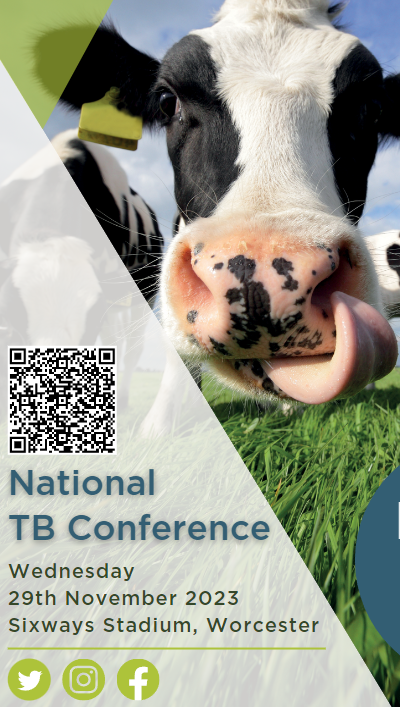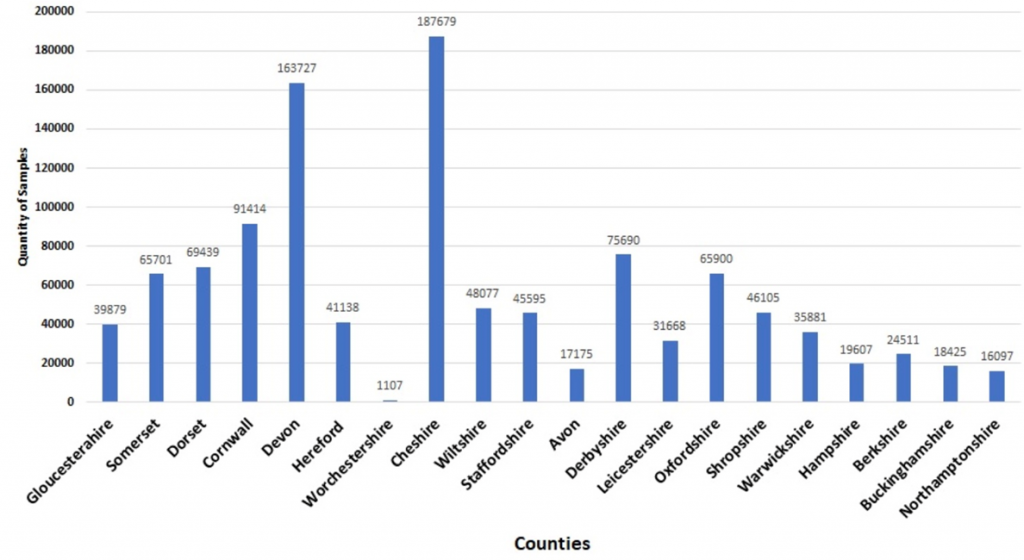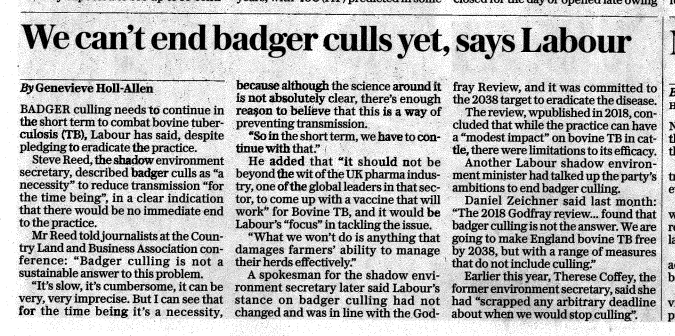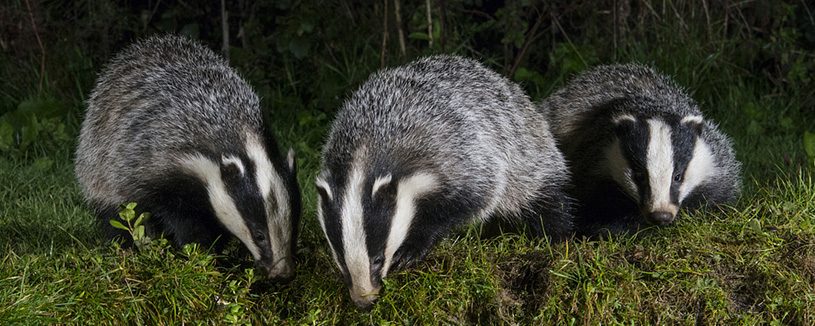In recent years Defra have made no secret of the fact that they aim to continue badger culling after the current intensive culls finish at the end of January 2026. The 2020 bovine TB policy outlined the intention to continue badger culling in ‘exceptional’ circumstances. APHA have been piloting a new ‘reactive’ style culling policy that aims to kill 100% of badgers, otherwise known as epidemiological culling or ‘epi-culling’ in Cumbria and Lincolnshire. This pilot has failed to eliminate bovine TB however, (see Chapter 5 of ‘A bovine tuberculosis policy conundrum in 2023′ ) and simply served to highlight persistent infection in a handful of farms.

‘Epi-culling’ has been licensed by Natural England since 2018 despite its ongoing failure. Badger Trust was told by Lord Richard Benyon (Minister of State at Defra) in written correspondence, and by Eleanor Brown (now deputy Chief Veterinary Officer) at a meeting, that a consultation on this new epi-culling policy would be launched this year. This now seems not to be the case. In this recent article in VET Times, a Defra spokesperson was asked whether the anticipated consultation would begin before Christmas. The reply was “we are working to provide further detail at the earliest opportunity.”
Initially it was thought that the consultation would be in winter 2022 or Spring 2023. This was delayed to Summer, then Autumn, and then the middle of November. It may yet appear, perhaps this winter, but indications are that Defra are rethinking.

The National TB Conference in Worcester on 29th November might have been an opportunity to set out Defra’s intentions going forward. The programme for the event listed senior speakers/participants including Lord Benyon (Defra Minister), Christine Middlemiss (CVO) and James Wood (Head of Department of Veterinary Medicine at Cambridge), long-time supporter of badger culling. But Lord Benyon did not even turn up, & it was left to a few of the pro-cull vets to make statements on their personal ‘views’ about the success of badger culling. Perhaps they had hoped that APHA’s pre-print on the effects of badger culling might have been published by now. But there are serious issues with this analysis, see here and here.
So why has the consultation on epi-culling been delayed? Are Defra beginning to realise that badgers are not a significant player in bovine tuberculosis after all?
Three possibilities………
- The epidemiology of bovine tuberculosis science does not support their position on epi-culling, (see this independent report). APHA’s latest epidemiology report has changed its method of assessing attribution of disease, (see here).
- The science behind culling is uncertain & becoming frailer. A peer-reviewed paper in 2022 failed to find any association between the industry led badger culling 2013 – 2019, and either the incidence or prevalence of bovine TB in cattle herds (see Langton et al 2022). Following on from this analysis, a pre-print looking at the original RBCT analysis found that alternative & more appropriate analyses of the data found no effect of badger culling (Torgerson et al).
- There will probably be a General Election next year. Pushing out a consultation on a scientifically fragile badger cull policy, that is also cruel, potentially ecologically damaging and economically unsound is not a vote-winner for a political party. A majority of the public remain opposed to badger culling.
Meanwhile, in the House of Lords on December 12th, Conservative peer Lord Colrain, asked “What progress they have made towards identifying a vaccine for eradicating bovine tuberculosis?” Labour peer Lord Granchester took the opportunity to quote a reduction of 51% in herds under restriction in Cheshire, appearing to claim this as a win for badger culling, and suggest that it would make sense “to allow all areas of England to undertake a cull to control disease in cattle, disease in badgers and stress in rural communities before introducing vaccination?” He failed to mention that Cheshire has actually had more gamma testing than any other county in the country as shown in the bar chart below. It is the increased use of gamma testing that is most likely responsible for the observed decline in herd breakdowns.

It is still a bit unclear what Labour will do with bovine TB policy if they are elected to government in due course, with their messaging inconsistent at present. Shadow Defra Minister Steve Reed recently told journalists at the Countryside Land and Business Association conference that there is enough reason to believe that badger culling is a way of preventing transmission, so “in the short term we have to continue with that”. Sue Hayman (former Shadow Environment Minister) meanwhile said at the launch of a Wildlife Link report recently, that badger culling would be brought to an immediate end. Current Shadow Environment Secretary Daniel Zeichner was quoted in The Guardian (here) in October saying “I’ve spent a long time looking at this…….We’re going to make England bovine TB free by 2038, but with a range of measures that do not include culling.”

None of this is satisfactory. Secrecy cloaks every move, and stakeholders remain outside what should be an open and careful discussion of the various technological and economic options. It is in no one’s interest to let factional lobbying and secret deals continue with the wasteful and cruel outcomes seen over the last ten years.

We have now reached the point where a handful of pro-cull lobbyists are promoting their ‘views’ on the success of badger culling and making statements that are simply not borne out by the facts. Dick Sibley (a vet who has worked on alternative bTB testing approaches), in a recent letter to Vet Record, comments on “the unfortunate paucity of scientific evidence” that currently underpins current advice, and concludes that “the effect of the mass killing of hundreds of thousands of badgers has been disappointing, to say the least”.
The latest government epidemiology summary shows that half of breakdowns are now herds with embedded disease, herds breaking down for a second, third or more times. Why? Because infection is not being caught by conventional testing. It is not that hard to work out why public money has been frittered over the last ten years on a policy with no end point. It has been deemed just too tough to grasp the nettle and get on with the difficult and expensive job of better testing and some herd depopulation, with farms left fallow for several years. This reality cannot be put off any longer and the economics of a new campaign need to be clear for all to consider, with relevant measures to achieve prompt bTB control, not decades more of subsidised nonsense.

